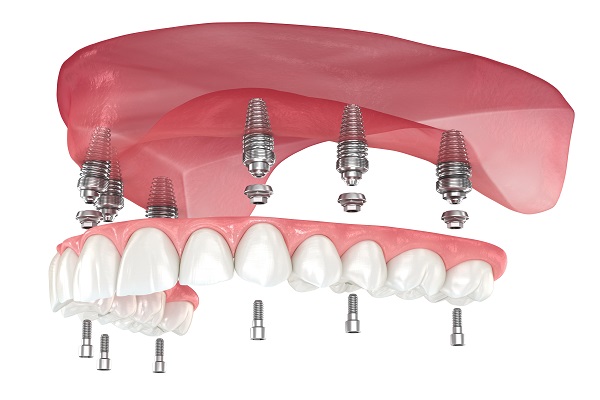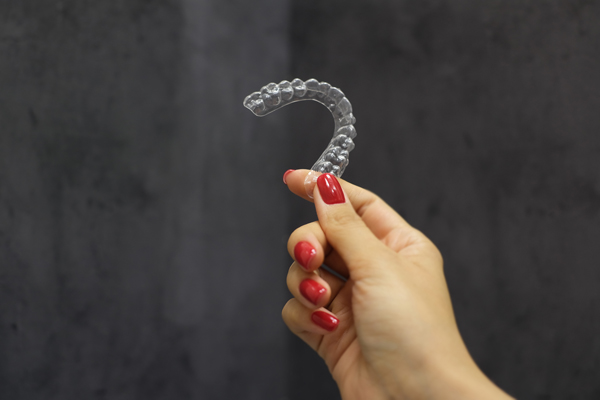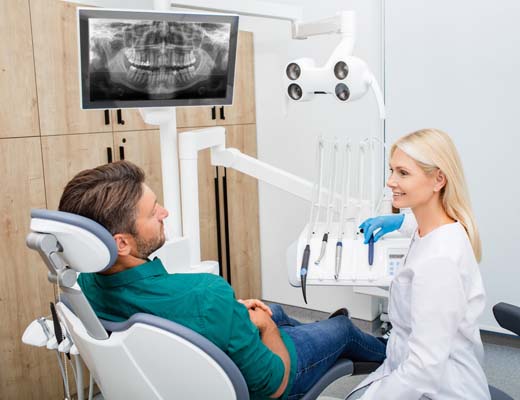Common Questions About Implant Supported Dentures

When it comes to replacing a full dental arch with implant supported dentures, patients often have many questions about the process. This article answers some commonly asked questions about implant dentures.
What are implant supported dentures and how are they different?
The structure of implant supported dentures is exactly as the name sounds; a full denture supported by dental implants. The implants are titanium posts placed inside the jawbone to anchor the dentures, thus keeping them stable for dental functions like talking and chewing. This method uses four to six implants placed along the upper or lower jaw. This contrasts with regular dentures, which rely on adhesives and gum suction.
With implant dentures, patients will not have to deal with the discomfort or irritation caused by unstable regular dentures. They can enjoy their regular meals and speak or laugh confidently without worrying about their denture slipping or falling out.
Can I get implant dentures if I already have regular ones?
Even those who have been using regular dentures for several years can still opt for implant supported dentures. They are often the ones who appreciate the remarkable benefits of having a stable dental restoration. In some cases, the dentist can use the existing dentures as a fixed temporary option as the patient recover from implant placement. However, if the patient has been missing their natural teeth for too long, they may have experienced bone loss, meaning a bone graft procedure will be required to place the implants successfully.
What if there are still some natural teeth present?
The people who are qualified to get implant-supported dentures are missing a significant portion of their natural teeth, probably due to multiple dental cavities, untreated gum disease or accidents. The bottom line is that they must have reached a stage where starting afresh with a new dental restoration is advisable. However, if there are still many healthy, natural teeth left on the jaw, the dentist will recommend other alternatives to restore dental function, such as implant-supported bridges, crowns or partial dentures. The goal is always to save natural teeth when possible.
What is healing with implant supported dentures like?
After the insertion of dental implant posts inside the jaw, patients will go through a stage called osseointegration – during which the bone fuses with the implants to ensure the success of the dental restoration process. The implant mimics the function of natural tooth roots. After three to six months, the patient will be ready to get permanent dentures affixed to the implants if everything goes well.
How long do implant dentures last?
Regular dentures can withstand between five to seven years of use before needing repair or replacement with proper care. Implant-supported dentures can survive up to ten years or more without repair or replacement. Those who care for implant retained dentures may even have them for a lifetime.
Are implant dentures your best option?
The only way to be sure you are eligible for implant supported dentures is to meet with the dentist to discuss your needs. The dental professional will be happy to answer any additional questions you may have and help you make a guided decision.
Request an appointment here: https://drcaffeyearle.com or call Smiles By Design at (972) 528-5536 for an appointment in our Flower Mound office.
Check out what others are saying about our dental services on Yelp: Implant Supported Dentures in Flower Mound, TX.
Recent Posts
The popularity of Invisalign® has grown as the treatment has proven to produce successful and positive results. Additionally, the treatment process is unlike any other. The actual process is a lot simpler than traditional approaches, and there are benefits that come with Invisalign® too. One more important part of Invisalign® treatment is the need to remain disciplined with wearing…
Many patients are nervous before a dental bonding procedure, although the procedure itself is non-invasive, only takes one dental visit and does not require any anesthesia. You can prepare yourself mentally and physically for the procedure, however, by knowing what to expect, how to prepare and what to plan for after the procedure. The following details…
For many patients, sedation dentistry is a must for certain dental appointments. This branch of dentistry focuses on putting patients at ease and calming anxieties during visits. The use of sedation is most frequent when major treatments or procedures take place. These could include a root canal, filling, or restorative work such as a crown…
General dentists state that bruxism is a condition that involves the grinding of the top and bottom arches of teeth. The act often happens at night while a person is asleep, making it involuntary. However, some individuals are also known to grind their teeth during the day as well. Although teeth grinding does not sound too…


